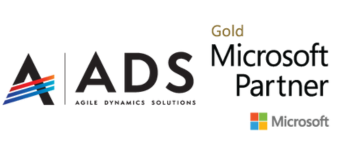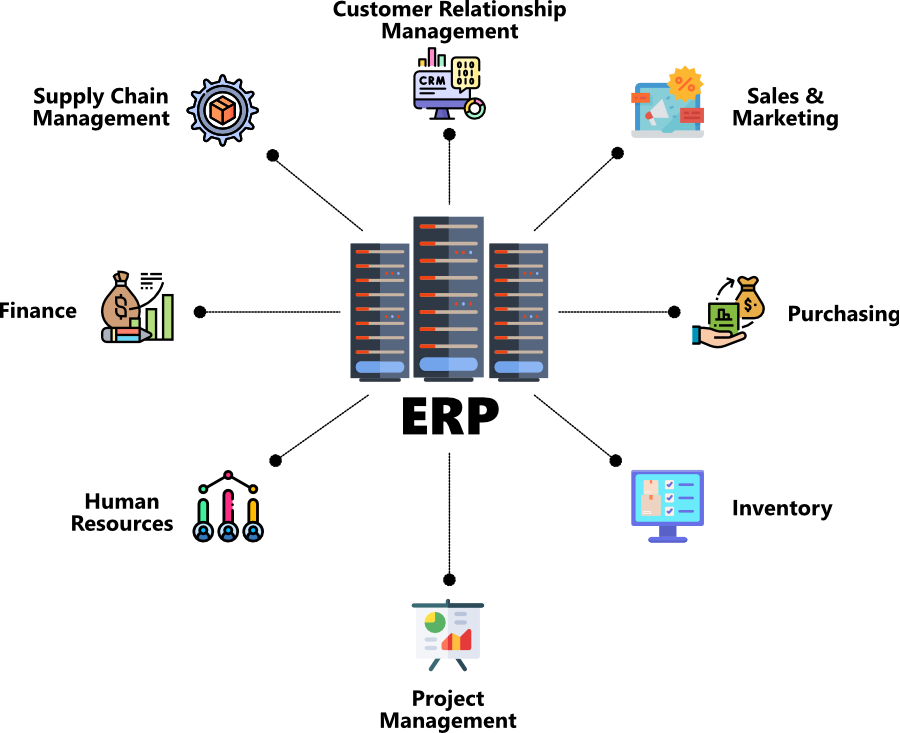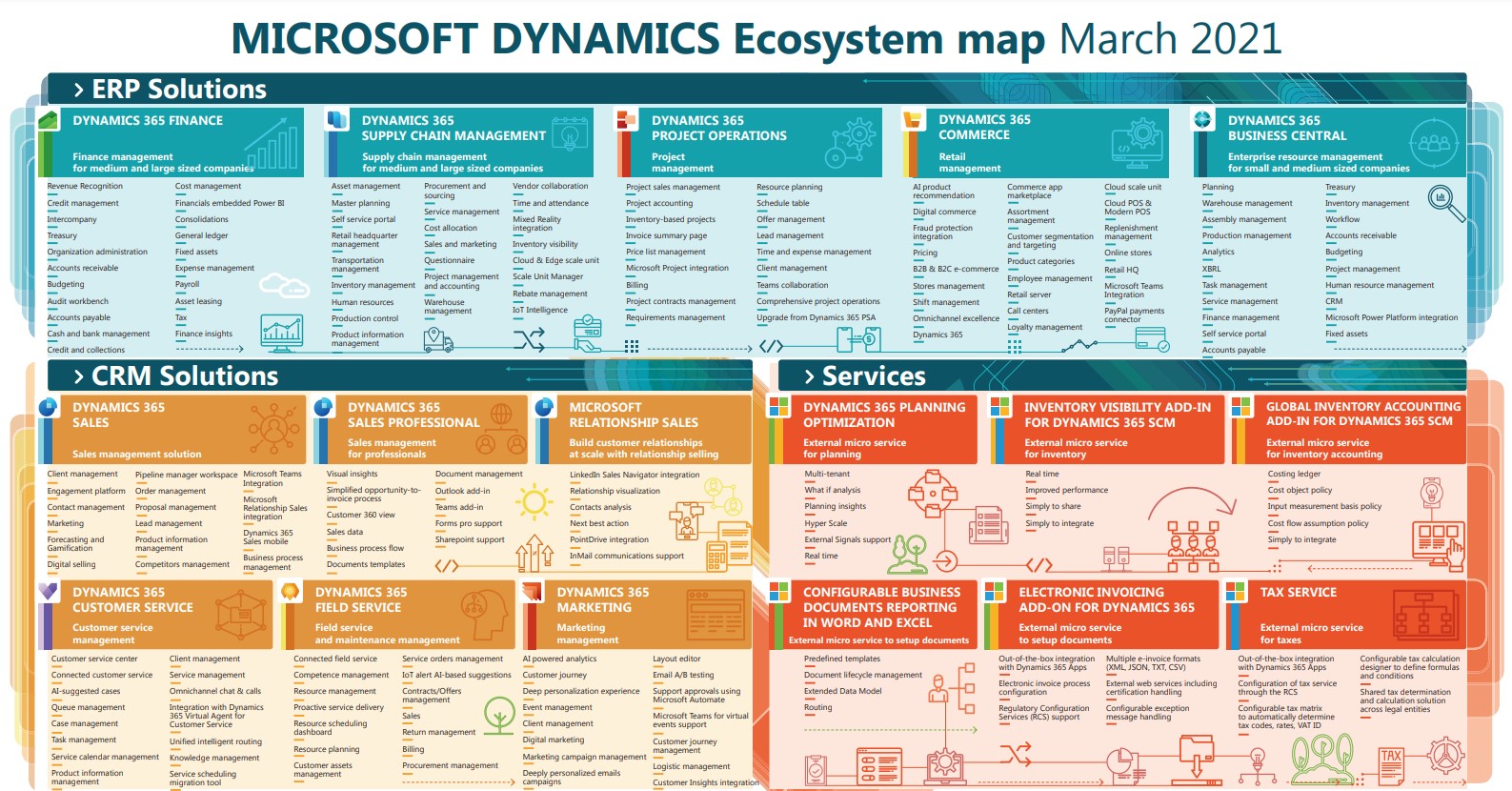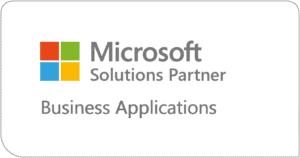View the full Microsoft Ecosystem Infographic.
ERP System is Made Up of Different Module
If you are researching ERP then you might picture an ERP system as one standalone system that provides the features your company needs to manage a business.
However, this would be extremely expensive for a business to have all the features as every business is unique with different needs and function requirements to manage their business.
Therefore, ERP systems are made up of different modules that can be simply plug-in with others. This decreases the price of owning the ERP system as you are paying only for the function your business needs and use.
Because many modules may not make sense for SMEs & SMB’s. For example, you are a Malaysian SMB business in Manufacturing or Retail industry then you might only need modules for your inventory management, sales, purchasing, accounting, and HR, but you don’t need a more complicated global financial management system.
Of course, as your business is growing, you can simply upgrade to more robust solution and add more modules to your suite of ERP applications. It is easy to start with just a few ERP modules and then add more as your business is growing or expanding.
Your business might be expanding into a global marketer, where you need more than a local accounting solution, but you will need a more robust financial management solution or supply chain management system.
This way, you only pay for modules and features your business truly uses without spending extra on things you do need, and as you grow you can always add new modules to become more innovative and respond to market changes faster.
That is why, you cannot picture an ERP system as a single standalone system, but a suite of modules that can be simply attached to each other as per company needs.
This means, that ERP systems integrate business processes that once were disparate purchased applications.
Why Choosing the Right ERP Modules is Important?
So, because the ERP system is made up of different modules that provide different capabilities and functions it is essential to make the right decision to make sure, you have the right module that helps you with the right business processes.
In many cases, ERP vendors are experienced, and they already know what you might be looking for based on your industry, organization size, and market. Therefore, before making any decision, it is always recommended to speak with the ERP vendor or their partners to find whether your selected module is the right fit, or they have a more appropriate solution for your needs.
Because in many cases different modules share the same features. For example, the Warehouse Management solution and Supply Chain Management solution can share the same functions as the inventory management solution. However, one of the modules can provide less advanced features and the other one can provide more advanced features.
Of course, not always more is better, especially if you only need the basic functionalities for your business as this would add more to the complexity of the system and the price as well.
Therefore, determining the right module for your business is essential to maximize the potential and ROI of your newly implemented ERP system and ensure it helps you with your business internal processes.
ERP Modules by Industry
Industry solutions are proven to enhance business efficiencies, decrease costs, and generally are a great investment to enhance solutions even more.
Modern ERP applications come with industry-specific types to match your industry needs, support your core business processes, and creating a better and more efficient automated business.
With that customers can find customized enterprise resource planning solutions to support their core business processes without spending money on modules that are not needed within the industry.
And while there is certainly almost any industry that can benefit from using ERP software I am going to mention the 9 most common sectors:
- ERP for Manufacturing: Helps Manufactures get real-time production and distribution planning, connect factories with IoT, AI, and mixed reality, and integrate the warehouse management system to increase agility, provide better business continuity, and cost savings.
- ERP for Distribution: Helps to deliver visibility into your sales data, inventory levels, and shipment schedules, giving you confidence in your ability to meet customer demands and more to enhance business processes and save costs.
- ERP for Retail: Helps to unified commerce across all channels encompassing sales, mobility, intelligence, and productivity to help retailers and workers achieve more in a cloud-first, mobile-first world.
- ERP for Construction: Helps achieve a high level of control over construction business, both in the office and in the field with the ability to remotely communicate job hours, materials, project milestones, and more from anywhere with any device in real-time.
- ERP for Financial Services: Helps financial institutions streamline financial planning, risk management, compliance, and client portfolio management, offering real-time insights for strategic decision-making. Integrates seamlessly with the Microsoft ecosystem and third-party systems, enhancing efficiency, automating processes, and enabling scalable growth for your financial services business.
- ERP for Healthcare: Helps providers a full, real-time insight into a patient’s journey: their medical history, care plans, medication, test results, diagnosis, delivery of services, compliance with regulation, it is financial reporting, and, ultimately, its engagement with patients and their families.
- ERP for Automotive: Streamlines production, supply chain, and distribution with IoT and AI integration. Offers real-time insights for decision-making, improves efficiency, enhances customer engagement, and drives growth in the competitive automotive market.
- ERP for Education: Helps From student and staff self-service portals, integration with financial systems, through to subscription management and higher education marketing tools, to access Cloud-based technologies for the effective management of the needs of students, staff, and partners.
- ERP for Government: Helps to do more with less amidst ever-decreasing government budgets, with less amidst ever-decreasing government budgets, while enhancing trust and security for the citizens and residents they serve, improve the efficiency and productivity of my agency and employees to better meet our mission
- ERP for Waste Collection: Helps coordinate all facets of their business from dispatching and fleet management to route planning and material movement tracking to save costs and time, remove repeatedly entering data into different software’s. Thus, increase the efficiencies and productivity of employees and businesses.
- ERP for Hospitality: Helps management and employees with the necessary tools to keep the customers satisfied, thereby ensuring repeat business. With increased flexibility, speed of service, and improved access to vital information, the LS Hospitality solutions streamline operations and reduce cost from a restaurant point of sale, omnichannel menu management, kitchen displays, or printers to tight control on inventory.
And these are the common industry-specific ERP systems, but of course, other industries can hugely benefit from using enterprise resource planning software to increase efficiencies, collaboration, connect people and products and save costs.
If you want to learn more about your industry and how ERP can help you, contact us so we can help you provide more information or a free demo.
ERP Modules by Needs
Most of the ERP systems are modular based which means you can choose which module is the best to fit your business needs and as your business grows you can add more as you need.
This makes it super easy for businesses to cover only business processes businesses need without spending money on unnecessary capabilities that are not needed.
Like this business can achieve even greater benefits and ROI from investing in ERP applications.
Typically, ERP modules are developed to fit the different needs of each customer and manage core business processes such as:
- Finance & Accounting: Helps with main accounting and financial management functions such as general ledger, and balance sheet; generates financial reports; and handles related transactions, such as invoicing and expense reporting.
- Supply Chain Management: Helps to manage procurement and supply of the goods, services, and other resources across the chain. From handling manufacturing and warehouse resources to managing transportation and execution processes, ERP solution takes care of all elements of the supply chain.
- Project Management: Helps project-centric businesses to manage their entire project management lifecycle to increase profitability, save costs, deliver the project faster and under budget, and much more.
- Human Resources: Helps to manage employee information, track employee records like performance reviews, designations, job descriptions, skill matrix, time & attendance tracking.
- Inventory: Help to track the stock of items. Items can be identified by unique serial numbers. Using that unique numbers inventory system can keep track of the item and trace its current location in the organization.
- Warehouse Management: Helps manage the storage and the movement of inventory. The system tracks the movement of every stock item such as the item received, picked, packed, and shipped.
- Order Management: Helps manage all orders to the warehouse, distribution center, or retail store after customers place them and track their status as they are prepared, fulfilled, and shipped to the customer. Helps to reduce losses and boosts on-time delivery rates and determine the most cost-effective option for fulfilling an order.
- Customer Relationship Management (CRM): Helps to boost sales performance through better customer service & establishing a healthy relationship with customers. All the stored details of the customer are available in the CRM module.
- Procurement/Purchase: Helps with processes that are part of the procurement of items or raw materials that are required for the organization. The purchase module consists of functionalities like supplier/vendor listing, supplier & item linking, sending quotation requests to vendors, receiving & recording quotations, analysis of quotations, preparing purchase orders, tracking the purchase items, preparing GRNs(Good Receipt Notes) & updating stocks & various reports.
There are more ERP modules your business can take advantage of and digitally transform the business to increase efficiencies and save costs.
If you want to learn more about ERP modules to fit your specific needs, contact us and we will provide you will information on how an ERP system can transform your business.
ERP Modules by Size of Company
The first category of ERP systems is by the size of the company. As business is growing the processes becoming more complex, extra work is required from employees, more staff needs to be hired, new departments might be open, and so on.
And while growing a business is an exciting time, there will be many new challenges the company has to face. Thus, these solutions are made to tackle some of the challenges of growing companies to help businesses be more agile and better manage growth.
ERP System for Small Business: These are accounting software to save time and resources by using the ERP system to automate processes for managing finances, payroll, and accepting payments.
ERP System for SMB & SME: These solutions can help SMBs connect their financials, sales, services, and operations to streamline and secure business processes, improve customer interactions, and make better decisions. (Visit Best ERP System for SMBs)
ERP System for Medium and Large: More complex ERP solutions help medium and large organizations to connect all business processes and departments to enable make better decisions quickly.
This is oversimplified ERP solutions by the size of the company to help you understand that ERP companies want to provide comprehensive solutions that fit business size.
But of course, there is more what each solution can do for you depending on the size of your business and your requirements.
That is why ERP systems need to be easily customized so they can better match your expectations and achieve expected benefits from the enterprise resource system.
ERP Extensions & Integration
ERP systems are great for businesses as they cover a lot of aspects of your business. And as you can see, there are many modules to fit your needs without paying extra for what you don’t need.
However, despite ERP customizations and modules, organizations have unique ways they operate and complete their day-to-day tasks.
Thus, many ERP vendors like Microsoft provide a place like AppSource to plug in ready-to-use extensions and apps on top of your ERP system and module.
Organizations often require the rapid building of purpose-built custom LOB apps. These may require data from many sources whether these are from cloud services, on-premise data, or business applications such as Dynamics 365.
PowerApps and Power Automate provide integration via Connectors and Gateways that make it possible for organizations to get data out of services they are already using.
A place like AppSource helps business users easily find and evaluate the line of business SaaS apps critical to their business.
SaaS apps unique to their industry and line of business (LoB) role, built by partners on top of Microsoft Dynamics, Office, Cortana Intelligence, and the Azure platform. Users can also discover content packs and add-ins for Microsoft business apps, like Dynamics CRM, Power BI, Office, and others.










